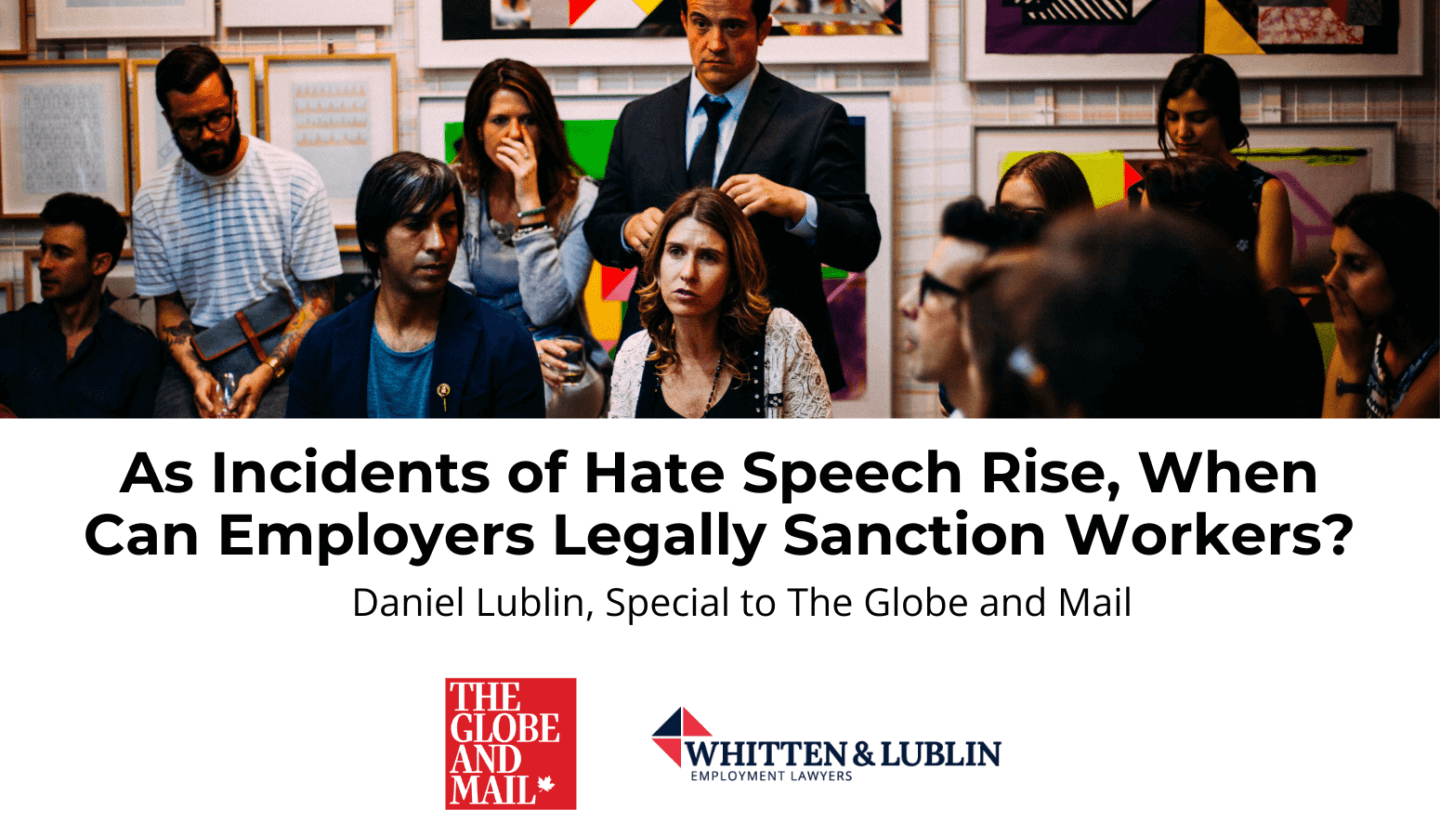
As Incidents of Hate Speech Rise, When Can Employers Legally Sanction Workers?
Published By: THE GLOBE AND MAIL
Incidents of Antisemitism and Islamophobia are drastically rising in Canada in the wake of the Israel-Hamas war and the employment-related legal implications are quickly emerging as many workers openly express their personal views and attend protests or rallies. What happens when their employers, or others, take offence?
I was recently shown a series of antisemitic social media posts made by another practising lawyer in Ontario that I found were particularly alarming as the Criminal Code prohibits “willfully promoting hatred by making statements against an identifiable group.” These posts really struck a nerve because lawyers are supposed to be held to a higher standard.
In addition to the Criminal Code, every lawyer in Canada is bound by provincially regulated codes of conduct that address how they are supposed to behave, including various provisions seeking to protect the public from all forms of discrimination. These rules extend to addressing lawyers’ behaviour in the community, including expressing their views on social media, because the mere fact of being a lawyer will lend extra weight and credibility to their statements.
Anyone can file a formal complaint to a lawyer’s governing body. Following an investigation, that governing body has the power to censure, suspend or even to disbar a wayward lawyer who fails to respect the rules.
Workplace laws won’t protect you from being fired for making comments deemed hateful online
Do employers have the same discretion to sanction workers for expressing their views or openly supporting one side of the conflict? Here is my effort to shed some light on several of the more difficult workplace legal questions I am encountering daily:
Can attending a demonstration be grounds for termination?
Attending a peaceful demonstration is not, by itself, grounds for discharge without severance. However, some have descended into something different, where racist slogans are chanted and displayed, and some people celebrate terrorism and violence.
If a worker attends an event that advances racist or derogatory narratives or promotes violence, even as a bystander, it can amount to cause for dismissal. This is particularly so where that worker is identified by others on social media, occupies a senior or client-facing role or is subject to a workplace complaint made to the employer by members of the public or co-workers.
Are online social media posts criticizing Israel grounds for discipline or dismissal?
Disagreeing with the actions of Israel, calling for a ceasefire or expressing sympathy or support for Palestinians does not, by itself, amount to a workplace offence, even if others are offended.
Employers do retain the right to terminate workers with severance pay merely if they disagree with their views regarding the current conflict, but workers cannot be targeted because of their religion or place of origin. For example, if a worker genuinely identifies or is perceived to identify as Jewish or Palestinian, a dismissal with severance pay could still be treated as discrimination by a human rights tribunal.
However, the problem is that many social media posts, including those of the lawyer referred to above, go beyond reasonable criticism and include offensive or hateful content. Sharing this material online, even if it were written by others, would violate the harassment and discrimination provisions of any properly drafted workplace code of conduct and can amount to cause for dismissal without severance.
For instance, the Canadian Football League recently dismissed a senior employee for social media commentary it deemed antisemitic and Toronto’s Hospital for Sick Children announced the suspension of a prominent anesthesiologist while it investigates anti-Israel content on his social-media account.
Even in the fever pitch of the current conflict, once an employer becomes aware of a potential issue of discrimination or harassment, it is legally compelled to take action. Human rights and health and safety legislation dictate that employers must provide workplaces free from harassment and discrimination. Therefore, an employer who does not promptly address a worker’s distribution of discriminatory or hateful content can be exposed to liability from other workers and clients, in addition to the potential for negative publicity.
Can signing an open letter denouncing Israel be grounds for discipline?
This would depend on the precise contents of the letter and whether it could be construed as promoting violence or discrimination, but if that were arguably true, then yes, an employer’s discipline can be appropriate.
What if you disagree with your employer’s decision to dismiss you?
Ultimately, employers are tasked with deciding whether a worker’s behaviour crosses the line. Workers who disagree are entitled to challenge those decisions in court or provincial labour tribunals. However, previous cases demonstrate the courts’ intolerance toward workers who offend others based on their religious beliefs or where they come from.
Can an employer refuse to hire a worker who has announced support for Israel or one who has criticized it?
Yes. Employers can make hiring decisions based on a candidate’s current or previously expressed views on the current conflict and many employers will screen social media profiles before extending offers. An employer could potentially go as far as asking a prospective candidate to declare which side of the conflict they support, without offending human-rights laws, unless the question was covertly designed to identify a candidate’s religious affiliation, creed or place of origin.
As I have written before, the right to free speech cannot be equated with a right to promote discrimination and hatred. When even lawyers get this part wrong, it should serve as a serious wake up call that urgent action is required.
Daniel A. Lublin is a partner at Whitten & Lublin, representing clients in workplace legal disputes. He can be reached at [email protected].



